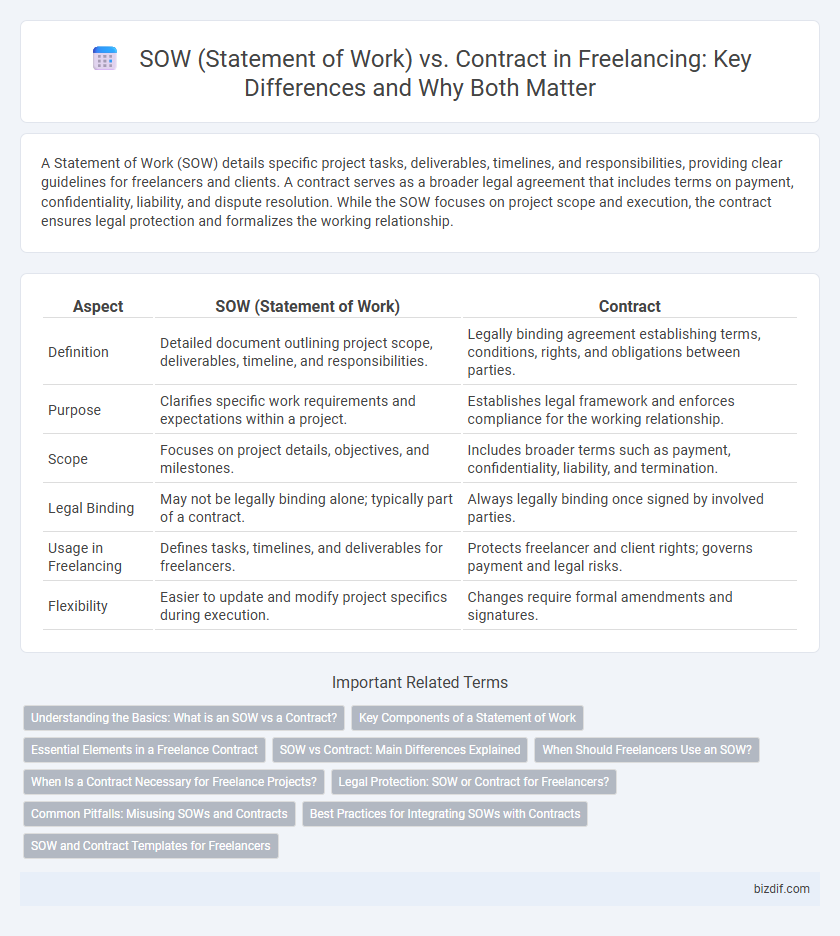A Statement of Work (SOW) details specific project tasks, deliverables, timelines, and responsibilities, providing clear guidelines for freelancers and clients. A contract serves as a broader legal agreement that includes terms on payment, confidentiality, liability, and dispute resolution. While the SOW focuses on project scope and execution, the contract ensures legal protection and formalizes the working relationship.
Table of Comparison
| Aspect | SOW (Statement of Work) | Contract |
|---|---|---|
| Definition | Detailed document outlining project scope, deliverables, timeline, and responsibilities. | Legally binding agreement establishing terms, conditions, rights, and obligations between parties. |
| Purpose | Clarifies specific work requirements and expectations within a project. | Establishes legal framework and enforces compliance for the working relationship. |
| Scope | Focuses on project details, objectives, and milestones. | Includes broader terms such as payment, confidentiality, liability, and termination. |
| Legal Binding | May not be legally binding alone; typically part of a contract. | Always legally binding once signed by involved parties. |
| Usage in Freelancing | Defines tasks, timelines, and deliverables for freelancers. | Protects freelancer and client rights; governs payment and legal risks. |
| Flexibility | Easier to update and modify project specifics during execution. | Changes require formal amendments and signatures. |
Understanding the Basics: What is an SOW vs a Contract?
An SOW (Statement of Work) is a detailed document that defines project-specific deliverables, timelines, and responsibilities, ensuring clear client-freelancer expectations. A contract is a broader legal agreement that outlines terms, conditions, payment, confidentiality, and dispute resolution between parties. Understanding the SOW clarifies project scope, while the contract provides the legal framework for the working relationship in freelancing.
Key Components of a Statement of Work
A Statement of Work (SOW) in freelancing specifically outlines project scope, deliverables, timelines, and payment terms, providing clear expectations between client and freelancer. Key components include objectives, detailed task descriptions, milestones, acceptance criteria, and resource requirements to ensure project alignment and accountability. Unlike a broader contract, an SOW concentrates on the execution details crucial for successful project completion.
Essential Elements in a Freelance Contract
A freelance contract must include essential elements such as the scope of work, deliverables, payment terms, deadlines, and intellectual property rights to ensure clarity and protect both parties. A Statement of Work (SOW) focuses primarily on detailing project specifics, objectives, and tasks, while the contract encompasses legal obligations, confidentiality, dispute resolution, and termination clauses. Clear definition of roles, responsibilities, and communication protocols within the contract reduces misunderstandings and fosters a smooth freelance collaboration.
SOW vs Contract: Main Differences Explained
A Statement of Work (SOW) defines specific project deliverables, timelines, and detailed requirements, acting as a project blueprint, while a contract establishes the legal foundation, outlining terms, conditions, rights, and obligations between parties. The SOW is often attached to or referenced within the contract, serving as a technical annex that ensures clarity on scope and work specifics. Contracts prioritize enforceability and risk management, whereas the SOW emphasizes the execution and measurable outcomes of the project.
When Should Freelancers Use an SOW?
Freelancers should use a Statement of Work (SOW) when the project involves complex tasks, multiple deliverables, or specific milestones that require detailed descriptions of scope, timelines, and responsibilities. An SOW clarifies expectations and reduces misunderstandings by providing a granular framework, which is essential for larger or ongoing projects where flexibility and changes might occur. Using an SOW alongside or within a contract ensures clear communication, scope control, and risk management in freelancing engagements.
When Is a Contract Necessary for Freelance Projects?
A contract is necessary for freelance projects when the scope of work, payment terms, deadlines, and intellectual property rights need clear, enforceable agreements to protect both parties. Unlike a Statement of Work (SOW), which outlines project specifics, a contract legally binds the freelancer and client, ensuring accountability and mitigating risks such as non-payment or scope creep. Complex or high-value projects, ongoing relationships, and sensitive deliverables typically require a formal contract to establish precise legal obligations.
Legal Protection: SOW or Contract for Freelancers?
Freelancers benefit more from contracts than standalone Statements of Work (SOW) for legal protection because contracts establish comprehensive terms, including payment, confidentiality, dispute resolution, and intellectual property rights. While an SOW details project scope, deliverables, and timelines, it lacks the enforceable legal clauses present in a contract that shield freelancers from liability and ensure compliance. Combining a detailed SOW within a legally binding contract offers the strongest protection by clearly defining expectations and mitigating risks.
Common Pitfalls: Misusing SOWs and Contracts
Misusing SOWs and contracts often leads to unclear project scopes, payment disputes, and missed deadlines in freelancing. A Statement of Work should detail deliverables, timelines, and responsibilities, while contracts legally enforce terms and conditions, including payment schedules and confidentiality. Failing to distinguish between these documents can cause scope creep and legal vulnerabilities, jeopardizing client relationships and project success.
Best Practices for Integrating SOWs with Contracts
Integrating a Statement of Work (SOW) with contracts requires clear alignment of project deliverables, timelines, and payment terms to ensure mutual understanding between freelancers and clients. Best practices include embedding the SOW as an annex within the main contract, specifying roles, responsibilities, and acceptance criteria to reduce disputes and enhance accountability. Detailed drafting and periodic reviews of the SOW alongside the contract foster transparency and support effective project management throughout the freelancing engagement.
SOW and Contract Templates for Freelancers
SOW (Statement of Work) and Contract templates are essential tools for freelancers to clearly outline project scope, deliverables, timelines, and payment terms, ensuring mutual understanding between freelancer and client. SOW templates provide detailed descriptions of specific services and milestones, while contract templates encompass broader legal terms including confidentiality, intellectual property rights, and dispute resolution. Using well-crafted SOW and contract templates minimizes risks, protects freelancer rights, and enhances professionalism in freelancing agreements.
SOW (Statement of Work) vs Contract Infographic

 bizdif.com
bizdif.com